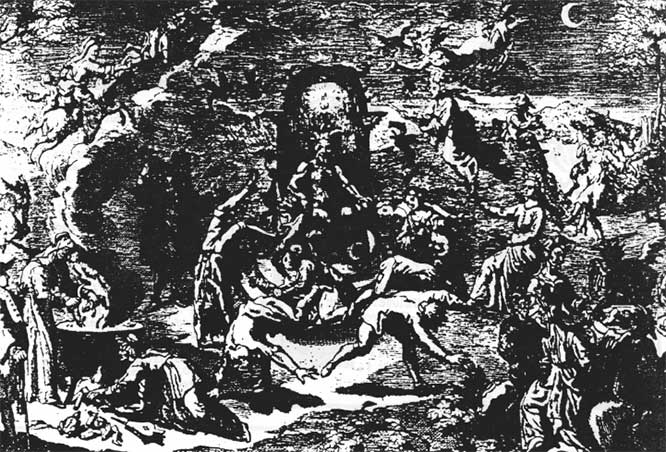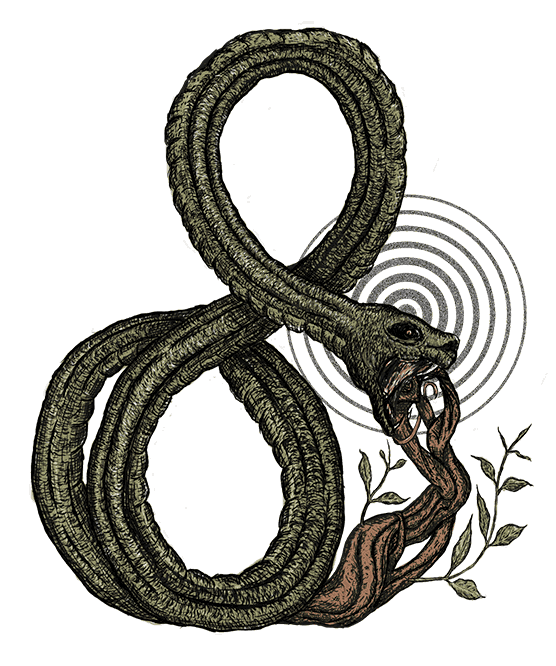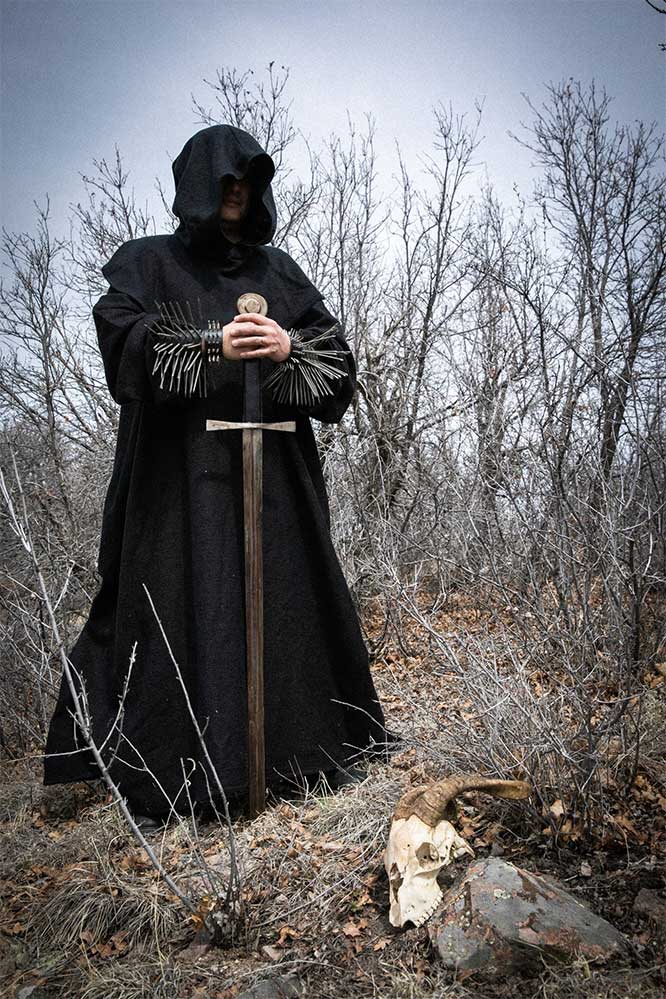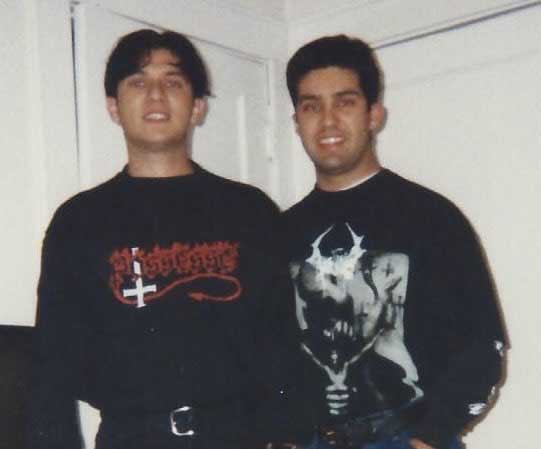Full Moon Productions I
2025-08-06
by Niklas Göransson
As a disaffected teenager in small-town Kansas, Jon ‘Thorns’ Jamshid summoned his own gospel. These are the origins of Full Moon Productions and Petrified ‘Zine — twin vessels of spiritual defiance that helped shape American black metal.
JON JAMSHID: My father is from Iran, and we came to America during the Iranian revolution. He barely spoke English, so finding work wasn’t easy for him; we moved around a lot and kept very isolated. When I was ten, we landed in a city with rough public schools, so my parents enrolled me in a Christian one which had more discipline.
Had religion been part of your upbringing until then?
JON: Not at all. My dad is a scientist and has always been aggressively atheist. My mom was raised Catholic, but she never pushed her religion on us. So, to suddenly find myself surrounded by teachers and classmates talking about the Bible and miracles… I couldn’t make sense of it.
Bit of a culture shock?
JON: Let me put it this way: imagine someone telling you he saw a whale swallow a person, and then later spit him back out. That’s exactly how I felt hearing those biblical stories. I’d sit there thinking, ‘What the fuck? You seriously believe this?’ But sure enough, they did.
In 1984, when Jon was thirteen, his family settled in a small Kansas town. By then, he’d begun gravitating toward rock and metal music.
JON: Most mainstream acts of the time felt bland. Nothing stood out. Then you’d see MÖTLEY CRÜE: bullet belts, pentagrams, fireballs – the works. Their whole aesthetic dragged me straight into another world; that’s what got me hooked on metal in the first place. Soon after, I discovered W.A.S.P.
W.A.S.P.’s self-titled 1984 debut blended the sleaze and swagger of glam metal with a darker, more menacing undertone. While many fellow LA acts leaned into party anthems, W.A.S.P. infused their sound with sadism, damnation, and inner torment – all wrapped in occult imagery.
JON: They had this raw, aggressive tone – lyrically and musically – that struck a deep chord. Every track floored me. Songs like “Tormentor” blew my fucking mind. I don’t know… I’m struggling to properly explain the impact of discovering these things. Am I making sense here?
Absolutely. Hearing the chorus of “Sleeping (In the Fire)” for the first time was, to me, as close to a mystical experience as an adolescent can have.
JON: Yeah, a hundred percent. I’d sit alone in my room, lights off, spinning that song – staring at the ceiling, imagining all kinds of twisted shit <laughs>. Those lyrics introduced ideas I’d never even considered; just ground-fucking-breaking. This went beyond music; it felt like an ideology.
Was it only American bands, or had European acts caught your attention as well?
JON: My brother got me into traditional metal like JUDAS PRIEST and IRON MAIDEN early on, and I loved it. Those bands had incredibly catchy riffs – memorable hooks, great choruses. While listening, I’d picture historical battles and other wild scenarios; it became a different form of escapism.
Given the theatrical and taboo-heavy nature of the bands that first appealed to you, did you immediately associate metal with rebellion?
JON: You know, I’ve thought about that a lot as I’ve gotten older. My family always supported me in whatever I wanted to do, so I never rebelled against them – my revolt was against society. Growing up, it always felt like most people were mere spectators, looking in from the outside.
How so?
JON: I just saw a lot of hypocrisy, especially from religious folks. As a kid, this shit really rubbed me the wrong way; that’s when the rebellion kicked in. I’ve always followed my own internal code and set of beliefs. For example, I’m not a thief; I treat people with respect and try to be decent. I don’t need some book telling me how to live.
You are referring to people who behave ethically out of fear of damnation rather than genuine courtesy?
JON: Exactly. Help a homeless guy? Get a better seat in heaven. Not out of compassion, but because they think God is keeping score. I don’t give a fuck about that. If I’m kind to someone, it’s because I want to be – not because I expect a reward.
Do you think those anti-religious sentiments deepened your appreciation for metal?
JON: Absolutely. That’s why, when my friend Tommy first played me VENOM’s “Welcome to Hell”, every track felt like it spoke directly to my soul. Later on, the band claimed to have used Satanism for shock value, but I didn’t care; they pushed me into the deeper and darker music.
Through his high school friend Tommy, Jon was introduced to a whole array of transgressive counterculture.
JON: Tommy was always on the cutting edge – into extreme metal, underground horror, anything rebellious or anarchic. His walls were plastered with band posters and seriously twisted shit: photos of suicides, stuff like that. I remember thinking, ‘This dude’s fucking nuts, but totally fascinating.’
Besides VENOM, what other discoveries did he facilitate?
JON: One of the first albums he lent me was RUNNING WILD’s “Branded and Exiled”. That same day, he handed me MERCYFUL FATE’s “Don’t Break the Oath” and said, ‘It’s not just a killer release – this motherfucker sells his soul to the Devil on the B side!’ I was like, ‘Oh, shit.’
The track in question, “The Oath”, opens the second side in a blaze of Satanic devotion – a pledge of diabolical allegiance, ceremonial invocations, and lines like ‘I deny Jesus Christ, the deceiver.’
JON: I don’t know if it’s true, but Tommy also said, ‘You know what’s amazing about this King Diamond guy? He used to sing in a church choir but got so disillusioned he turned his voice against Christianity – blasphemy as revenge.’ I thought, ‘Wow!’ Just the idea of Satanists weaponising something sacred… it left a huge impression on me.
Was it the music or the subject matter that spoke to you the most?
JON: The songs blew me away: how heavy they were, not to mention King Diamond’s voice… there’s nothing like it. But what really hooked me was the darker edge: devil worship, human sacrifice, destruction – anything taboo. And whenever I didn’t understand the lyrics, I’d look them up. Suddenly, I’m researching, following those threads.

While the local scene didn’t stretch much beyond Tommy, this period was when Jon discovered the wider world of underground metal.
JON: My small Kansas town had a population of 28,000 – and when you’re into extreme metal in a place like that, your circle is extremely limited. You can’t relate to anyone around you. So, once I started tape trading and writing to bands, it truly meant something. It felt personal.
Was this another one of Tommy’s introductions?
JON: Yeah. He told me, ‘Bands usually print their address in the booklet – you should contact them.’ So, I started writing to BATHORY, DESTRUCTION, SODOM… anyone I could find, basically. Pretty much everybody replied, except SODOM, I think.
What did Quorthon say?
JON: I sent him a two-page letter pouring my guts out about how much I fucking loved BATHORY. Expecting an epic response, I got maybe a paragraph <laughs>. But he threw in a few flyers, and one was for another Swedish band… can’t remember who, but I wrote to them – and they gave me Tony Särkkä’s address.
At the time, the young Tony ‘IT’ Särkkä – later of ABRUPTUM and OPHTHALAMIA – had a thrash act called WITCHES SABBATH.
JON: Tony was one of the first people I truly connected with. We shared the same bleak outlook – nihilistic, anti-religious – but he pushed everything way further. I leaned atheist whereas he went full-on Satanic. Nevertheless, talking to him felt like finally meeting someone who saw the world through the same lens.
What about local acts?
JON: Kansas had a handful of bands, most of whom went nowhere. There was one from Wichita… hmm. Oh, MANILLA ROAD! Really unorthodox metal, unique sound, weird vocals – I’ve always gravitated toward stuff like that. ORDER FROM CHAOS were killer too, though I didn’t discover them until later.
With that scarce of a metal population, did you get any decent shows?
JON: Sure. I mean, metal wasn’t huge in any single Kansas town, but across the eastern half of the state? Suddenly, you had hundreds of people seriously into it. And when bands like SLAYER or TESTAMENT rolled through? Picture all these small communities, each sending their metalhead delegation.
Did anyone from those crowds besides you go on to make a name for themselves?
JON: There was this one guy… I don’t know if you’re aware of Howard Stern, the radio host – but Richard Christy from that show? He grew up in some tiny Kansas town and showed up at all the same gigs. Richard ended up playing drums for DEATH, BURNING INSIDE, and a bunch of Florida bands.
After travelling around for shows, Jon soon met more like-minded metalheads in the region.
JON: We would gather to light big bonfires and perform Satanic rituals. There was this decommissioned missile silo nearby – probably ten storeys deep, doors locked up. We’d break in, throw heavy metal parties down there, and talk about seriously fucked-up shit.
Kansas isn’t exactly the first place one associates with anti-Christian terrorism fuelled by extreme metal, but Jon has described his local scene as surprisingly active.
In a 2024 interview with Dayal Patterson for the anthology Petrified: Under the Full Moon, Jon recalled vandalising a church. Considering the heavy evangelical and Mainline Protestant presence in mid-80s Kansas – right at the heart of the Satanic Panic – one might expect this to have sparked a major investigation.
JON: I mean, our town was tiny, and there wasn’t much of a police presence. We were doing all kinds of crazy shit, but no real trouble ever came down on us. You’d think people would immediately say, ‘It’s those metalhead assholes’, but that never happened. Every few months, we escalated – darker, more violent, more extreme.
Didn’t your parents intervene at all?
JON: No, they never imposed boundaries. If I wanted to do something fucked up, I went ahead and did it. Just last week, I attended a funeral in Kansas, and some old friends were reminiscing about all the insane shit we pulled. My wife couldn’t believe it. I told her, ‘Different times; I was young, with no limits and no internal governor.’
What about at school?
JON: Actually, in psychology class, our teacher asked us to keep a weekly journal. But instead of writing about real stuff – school, homework, whatever – I turned in stories based on my fantasies. So rather than saying I went to class or hung out with friends, I’d write about animal sacrifices, cutting myself, setting shit on fire, kidnapping people… all kinds of twisted stuff. None of it real, obviously.
I fail to see how you didn’t anticipate the fallout from this.
JON: Well, here’s the messed-up part: the teacher promised us it’d be strictly confidential. Then, out of fucking nowhere, he handed my journal over to the school counsellor. She wrote a psychological profile on me, saying I was antisocial, a sociopath, obsessed with the Devil – that I had a dark worldview and wanted to see the world burn. Just insane shit.
To be fair, from what you’ve told me so far, that doesn’t sound wildly inaccurate.
JON: <laughs> The truly fucked-up part? After I left the class, the teacher started using me as a cautionary tale – the ‘dangerous kid who’d gone off the deep end’. And it spread. Pretty soon, half the town had heard. But the stories were so over-the-top, you’d need a seriously low IQ to believe them.
log in to keep reading
The second half of this article is reserved for subscribers of the Bardo Methodology online archive. To keep reading, sign up or log in below.







